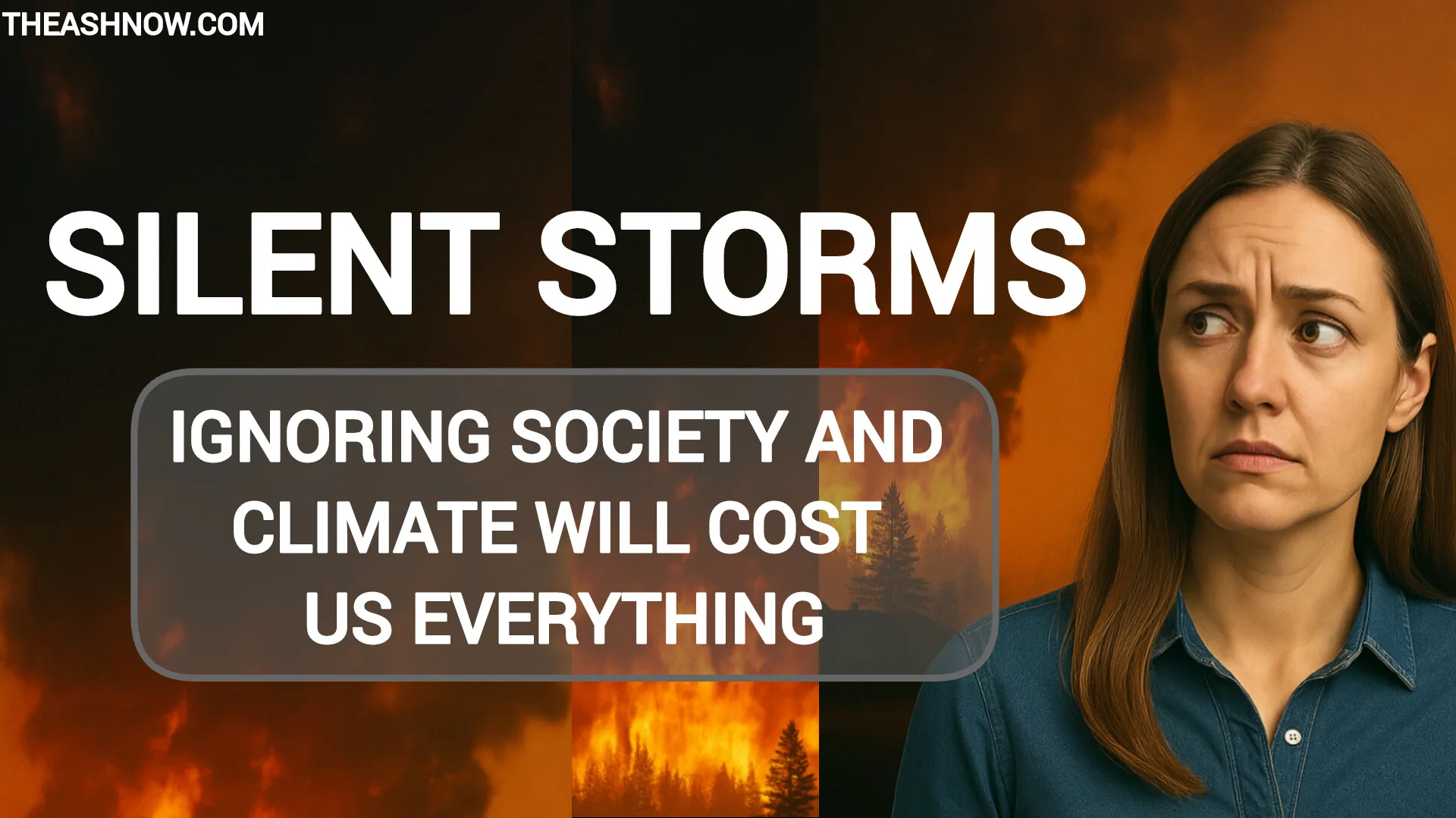In the 21st century, the biggest dangers don’t always arrive with a bang — sometimes, they creep in silently. Climate change and social decay are the “silent storms” that threaten to dismantle everything we’ve built. While wildfires rage and income inequality widens, many continue their daily routines with little awareness of the brewing catastrophes. For countries like the USA, UK, India, Canada, China, and Australia — often seen as global leaders — the cost of ignoring these interconnected crises could be everything we hold dear: health, safety, economy, and democracy.
Let’s take a deep dive into this storm, understand its silent yet devastating impact, and explore real-world solutions that every individual, community, and government must embrace — before it’s too late.
Table of Contents
🌍PART 1: THE CLIMATE CRISIS — A GROWING MONSTER WE’RE STILL IGNORING
❗ The Problem: Environmental Apathy in Daily Life
From melting glaciers to flooded cities, the signs are no longer distant. Yet, many still don’t see climate change as a “personal” issue. In Tier 1 countries:
- Commuters still prefer SUVs over electric vehicles.
- Households crank up their air conditioners, oblivious to their carbon footprints.
- Plastic packaging dominates grocery stores, despite the availability of alternatives.
While national policies matter, everyday choices create ripple effects. Studies show that 72% of greenhouse gas emissions come from household consumption. That means you and I are part of the problem.
🔥 Realistic Impacts on Daily Life
- Increased Energy Bills: As summers grow hotter and winters colder, reliance on HVAC systems skyrockets.
- More Frequent Disasters: Wildfires in California, floods in the UK, and heatwaves in Australia are now annual events.
- Food Insecurity: Droughts and disrupted agriculture are pushing grocery prices up.
- Public Health Crises: Respiratory diseases from pollution, and waterborne diseases from flooding are on the rise.
✅ Solutions: What Citizens & Cities Can Do
- Switch to Renewable Energy: Use solar panels and green energy providers where possible.
- Opt for Public Transport or EVs: Incentives exist in many Tier 1 nations.
- Adopt a Low-Waste Lifestyle: Compost, recycle properly, and support zero-waste stores.
- Vote Smart: Elect leaders who support strong climate action, not fossil fuel lobbying.
🧑🤝🧑 PART 2: SOCIAL EROSION — WHEN COMMUNITIES START FALLING APART
❗ The Problem: Rising Apathy Toward Society
While climate change steals the headlines, social decay is quietly corroding the fabric of Tier 1 nations. Think about it:
- Homelessness is rising in cities like Los Angeles, Toronto, and London.
- Mental health problems among youth are skyrocketing.
- Racism, inequality, and political polarization are widening the gaps between us.
When societies stop caring for each other, chaos takes over. Apathy becomes the silent killer.
⚠️ Daily Life Consequences
- Mental Isolation: In a hyperconnected world, people are lonelier than ever.
- Increased Crime & Homelessness: Due to a lack of support systems and affordable housing.
- Loss of Trust in Institutions: Governments, media, and even science face skepticism.
- Polarized Communities: Neighborhoods divide based on race, class, and political views.
✅ Solutions: Rebuilding the Social Fabric
- Support Local: Buy from local businesses and support community-based initiatives.
- Volunteer: Give time to shelters, food banks, or mentoring programs.
- Promote Mental Health: Normalize therapy, advocate for mental health funding in schools and workplaces.
- Be Politically Active: Attend town halls, engage in peaceful activism, and educate others.
🔄 PART 3: WHEN CLIMATE & SOCIETY COLLIDE
Climate and society aren’t two separate storms — they’re one massive hurricane feeding into each other.
How They Interact:
- Climate Disasters Displace the Poor: Floods and fires force low-income families into homelessness.
- Food & Water Shortages Breed Conflict: Scarcity increases global migration and border tensions.
- Environmental Racism: Marginalized communities are often placed near factories and toxic waste sites.
- Youth Depression: Eco-anxiety is now a real psychological diagnosis among Gen Z.
Ignoring one means worsening the other.
💡 PRACTICAL DAILY CHOICES THAT MATTER
Let’s move from theory to actionable lifestyle changes. These habits not only make your life better but also help the planet and society at large:
| Daily Activity | Current Norm | Conscious Alternative |
|---|---|---|
| Morning Coffee | Disposable cup | Reusable cup / eco-friendly café |
| Grocery Shopping | Single-use plastic bags | Reusable cloth bags |
| Commute | Gas-powered car | Bicycle / EV / Public Transport |
| Diet | Processed meat-heavy | Plant-rich, local produce |
| Home Heating | Max thermostat | Smart thermostats, insulation upgrades |
| Online Behavior | Social media doomscrolling | Support digital well-being apps |
| Voting & Citizenship | Low engagement | Join local councils, vote responsibly |
🧠 THE PSYCHOLOGY OF IGNORANCE
Why do people ignore these urgent problems?
- Comfort Bias: Change is hard, especially when it disrupts comfort.
- Media Fatigue: Constant bad news desensitizes people.
- Learned Helplessness: “I’m just one person, what can I do?”
- Consumer Culture: We’re trained to consume, not conserve.
Overcoming apathy means retraining the mind to care. Small steps build up to big change.
🚨 WHAT HAPPENS IF WE CONTINUE IGNORING?
If these “silent storms” remain ignored, Tier 1 countries could face:
- Economic Collapse: Insurance companies are already losing billions from climate-related claims.
- Mass Migration: Coastal and disaster-prone areas will become uninhabitable.
- Civil Unrest: When inequality grows unchecked, history shows that revolution is inevitable.
- Global Repercussions: Tier 1 countries are role models — their failure sets a dangerous precedent.
🌈 A FUTURE WORTH FIGHTING FOR
The good news? We can turn the tide. Climate science and social psychology offer hope — but only if we listen and act. Here’s what a better future looks like:
✅ Net-zero emission cities
✅ Universal basic services (housing, healthcare, education)
✅ Communities that support each other
✅ Youth who feel hopeful, not helpless
✅ Governments that serve people, not corporations
🔚 Conclusion: You Are the Eye of the Storm
The silent storms of climate neglect and societal apathy are intensifying — but they’re not invincible. The winds may be picking up, but the direction they take depends on you.
Your vote. Your habits. Your empathy.
Because when silence breaks, let it be the sound of people rising, not systems collapsing.
📢Please Contribute To Save This Planet & Society
- Share this article with someone who needs to care more.
- Make one lifestyle change this week that aligns with the solutions.
- Subscribe to newsletters that educate you on sustainability and civic engagement.
Frequently Asked Questions (FAQs)
1. Why is climate change considered a “silent storm”?
Because its effects accumulate slowly and often invisibly — rising temperatures, melting glaciers, and extreme weather seem distant until they suddenly disrupt daily life, making it one of the most underestimated global threats.
2. How does social apathy affect Tier 1 countries like the USA or UK?
Social apathy leads to increased loneliness, mental health issues, and community breakdown. In wealthy countries, it causes a widening gap between the rich and poor, fostering political unrest and civic disengagement.
3. What are some realistic daily changes I can make to fight climate change?
Use energy-efficient appliances, reduce meat consumption, switch to public transport or EVs, shop locally, and reduce single-use plastics. Even one change can have a ripple effect.
4. Can ignoring these issues lead to economic collapse?
Yes. Climate-related disasters are already costing billions annually. Combined with social unrest from inequality or displacement, these issues can destabilize economies and governments.
5. How can I inspire others to care about climate and social issues?
Lead by example. Share facts, stories, and resources. Encourage conversations, support local causes, and use social media to amplify impactful voices. Change starts with awareness.



Love this content.. keep going 🎉
Thank you so much! Your support means a lot 🎉💚 Stay tuned—more powerful content coming your way! 💥